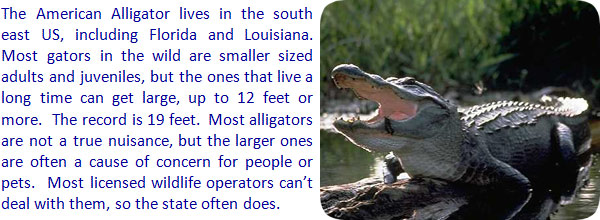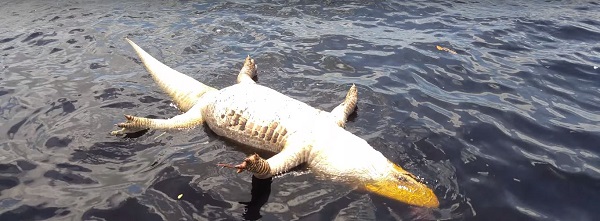 If you need alligator help, click my Nationwide List of Alligator Removal Experts for a pro near you.
How to Kill Alligators
If you need alligator help, click my Nationwide List of Alligator Removal Experts for a pro near you.
How to Kill Alligators
Alligators are freshwater creatures that have been typically demonized throughout history and pop culture. Alligators normally eat and live in their own wild habitat and do not bother humans. They may wander into human habitat if their own home has been harmed or destroyed—most often by human development and disturbance—and they are in need of food. While burly and strong, alligators are extremely fast. If one has come near where you live, steps need to be taken to get the alligator back to its own habitat. Only in the most extreme and life-threatening cases should you kill an alligator. It upsets the balance of your ecosystem and is illegal in most places.
 Prevention
Prevention
If you are going to an area where alligators are known to live—rivers, streams, marshes and swamps—do not let your household pets some with you. They will wander mindlessly down to the water and become vulnerable to becoming an alligator’s meal.
If you live near a natural alligator habitat, placing a concrete or wooden bulkhead retaining wall or wire mesh fence around your yard will keep the animals out. If you are really concerned, do not have any ponds or marsh like vegetation around. Reducing vegetative cover will deter alligators from hanging around. The alligator will think your yard if they look the same.
Frightening the animals or poking them with sticks has limited success. It mostly aggravates the alligator and frightens them into self-defense.
Who to Call
Contacting your local animal humane society or game control should be your first step if an alligator has wandered into your yard or backyard pool. These are trained professionals who have dealt with alligators out of habitat before and will use the most efficient and effective methods for ridding you of an alligator.
Trapping
Baiting alligators into traps is the first thing to do. They love to eat fish but even beef or chicken will work. Trip-snare traps can catch an alligator without hurting it. Place boards loaded with a bait trail that lead the alligator into the snare. Eventually it will put its head through the self-locking snare. These traps can also be placed in the water.
For a particularly dangerous gator, it is possible to kill them with a trap. Place bait on the end of a hook and line with a large rope accessible to you. Place trap just above the water and leave overnight. Once the alligator has eating the bait, the hook will catch itself in the alligator’s stomach. You can then drag the alligator with the attached rope. The hook itself will probably not kill the alligator. To put it out of suffering, it is unfortunately necessary to shoot the animal.
Releasing
Getting an alligator back into its natural habitat may be a large chore to do alone. They are very large and heavy animals. A large vehicle like a truck or van is necessary. Call your local authorities to determine how to best move the trap and alligator to a relocated area.
Weaponry
A shot gun or rifle will probably work if you know where to aim.
Powerheads are another type of ammunition-powered weapon that is used underwater for gator hunting (where legal) and for protection from large aquatic life, such as sharks. Bangsticks are powerheads mounted on a metal shaft or wooden pole. These devices should be only used for self-protection.
Shooting the animal is much trickier than just pulling the trigger. To make sure it dies, shoot the alligator at the base of its skull behind the eyes. Their brains are very small and easy to miss. If you are not skilled and knowledgeable about where to shoot, the bullet will not kill the animal and it will become wildly aggressive.
Discarding
A deadweight alligator is going to be incredibly difficult to dispose of. They are illegal to kill so contacting your local authorities may be tricky of you killed it in a non-life threatening situation.
Alligators are extremely important to swamp and marsh ecosystems. They are protected by law for good reason. While powerful, they will not harm humans unless provoked. Prevention is the best method—once you have an angry alligator or suffering alligator on your hands, the situation just got worse.